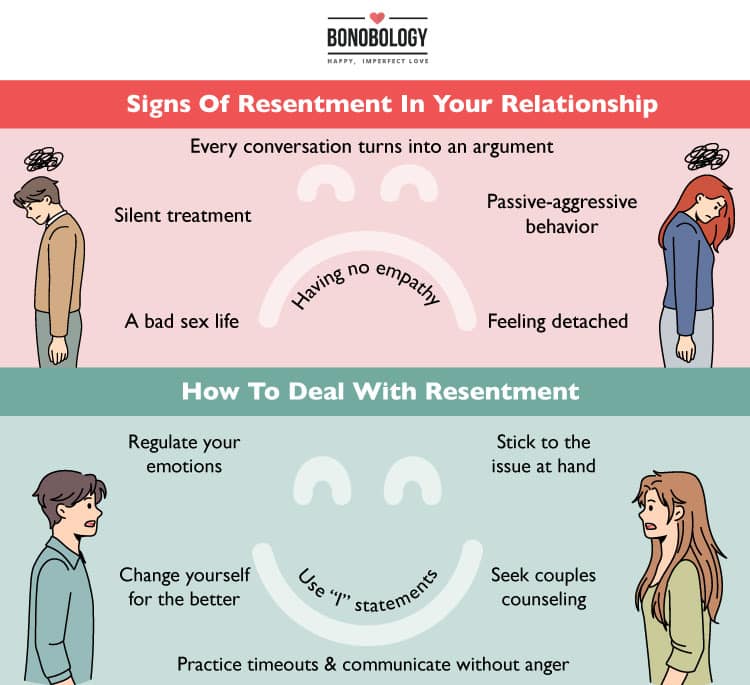Here, we need to understand the difference between resentment and hatred or anger. The latter can last for a short while. It may result in fights, disappointment, and irritation with your spouse but soon, all is forgotten and things go back to normal. However, resentment in a relationship is far more deep-rooted. Dealing with resentment in relationships needs a certain amount of emotional awareness and a will to put in efforts to bring about a balance. With the help of counselor and marital therapist Prachi Vaish, a licensed clinical psychologist with the Rehabilitation Council of India and an associate member of the American Psychological Association, let’s take a look at what resentment does to a relationship and how you can deal with it.
What Causes Resentment In A Relationship?
Before we can get to figuring out how to get rid of resentment, it’s important to understand why it exists in the first place. “My wife resents me, how do I fix it when I have no idea what went wrong between us?” Gregory, a 35-year-old banker told us. Though a situation like that may make you feel like your dynamic has already suffered a heavy blow, that may not necessarily be the case. The signs of resentment in a relationship can manifest for a variety of reasons, and though some are more severe and deep-rooted, others can be easily corrected by improving communication in your relationship. Let’s take a look at a few reasons behind contempt and resentment among couples, so you can understand what might be going wrong in your bond.
1. Letting the past weigh you down
As is the case in any relationship, you and your partner will make your share of mistakes. One reason behind resentment in a relationship could also be that these mistakes have not been forgiven by the partners and the grudges linger on. This can lead to a sense of animosity, which is one of the biggest signs of resentment in a relationship.
2. Marriage resentment stems from needs or wants not being met
“My husband resents me because he’s not satisfied sexually,” is a recurring theme. When you’re sharing a roof with someone, you expect your needs and wants to be met, so you can get the “happily ever after” that everyone talks about every so often. But when one partner is consistently made to feel that their needs aren’t being accounted for or have been completely disregarded, there’s bound to be some hostility.
3. Incompatibility is a major reason for contempt and resentment in marriage
“My spouse resents me because he thinks we don’t fit well together,” Jolene told us. “He’s always saving money, and I can’t help myself when there’s a sale going on. It didn’t seem like that big of a problem in the beginning, but now we keep fighting about it all the time. It has led to verbal abuse in the relationship, which, I think, is going to be the end of us.” According to studies, incompatibility is one of the biggest reasons why couples get divorced. If you’re on a spiritual, vegan path and your calling in life is to make sure animal rights are practiced, you’re not going to get along well with a meat-eater, are you?
4. One-sided relationships lead to negative feelings
As your relationship progresses, the type of love you feel for each other changes, the intensity wanes, and a sense of compassion sets in. But when instead, it begins to feel like a one-sided relationship, there’s bound to be resentment in marriage. It doesn’t even necessarily have to mean that one person has fallen out of love, the lack of reciprocity can often lead to feelings of resentment.
5. Taking your partner for granted
When the things you do for your partner almost feel like they’re “expected” out of you and are never appreciated, it’s bound to make you feel like there’s no love or appreciation anymore. “I do everything for him, the chores, cook his meals, make sure he has all his obligations in order, all of this while working as well. Despite all this, I’ve never heard even a few words of affirmation from him, and it’s starting to feel like my husband resents me even though I’m the one making all the sacrifices,” Meghan told us. If reading the causes has got you drawing parallels to your own dynamic, it’s important to take a look at the signs of resentment in a relationship so you can make sure of what you’re going through. The sooner you’re able to diagnose the problem, the sooner you’ll be able to fix it.
7 Signs Of Resentment In Your Relationship
Resentment means harboring ill will toward your spouse – often built up over a period of time. It builds up so much that their mere presence makes you angry and uncomfortable. Prachi says that resentment occurs primarily because of two reasons: a mismatch of expectations and a breakdown of communication. She also points out the basic difference between resentment and anger, which are often confused as the same. “Anger can come and go but resentment is the grudge that gets left behind. Underneath every resentment, there are some deep-rooted emotions,” she says. Then there is the role of cognitive errors. “Communication problems play a big role. You may perceive certain things said by your partner in a certain way and build a scenario around them. The other person reacts defensively or maybe even aggressively feeding to the negative emotion you have already built up towards the other,” she adds, elaborating on the signs of resentment in marriage. Based on this understanding, let’s take a look at some common behavioral patterns to watch out for:
1. There’s resentment in marriage if you exchange sarcastic comments and words
What used to be honey and sugar turns into barbs and snipes when a once-loving relationship turns resentful. Both men and women can indulge in this kind of behavior where they pass caustic remarks on each other, sometimes in the presence of others. They try their best to put each other down, using barbed words, often under the guise of humor. And if it is a full-fledged fight, be prepared to hear lots of hurtful words from your partner.
2. Passive-aggressive behavior leads to marriage resentment
This non-verbal sign of resentment in marriage is often exhibited by women. “Women may either completely cut off and stop engaging with their partner or they may go to the other extreme and try and provoke. Women want explanations more than men but might hesitate to ask for one, especially if their partner is dismissive of the problem. That’s when they use words to provoke and get a reaction,” says Prachi. Needless to say, it leads to more anger and toxicity.
3. The silent treatment and avoidance are the norm
This is more seen among men. While women can be confrontational, men give silent treatment when they want to show contempt in a marriage. It is regular for them to withdraw when they have a problem while a woman’s natural tendency is to talk it out and connect with someone. Other signs that your husband resents you include comparisons and needless jibes. They may make off-hand remarks about someone else’s wife or friends knowing that it may rattle you. When that happens, overcoming resentment in a marriage may seem extremely difficult.
4. Argument as a way of life
Constant, unending relationship arguments are also signs of resentment. From household matters to important decisions of life, partners who resent each other love to disagree on everything because these fights are the only things that bring them together. Confused? Let us explain. Some men and women subconsciously seek a fight because that’s the only point where they have an honest conversation with each other. Most other times, they stay out of each other’s way. Fights bring them on one platform, even if it’s in a toxic way. “Every time we talk, it turns into an argument. Even if we’re talking about household chores, somehow, the voices get raised and the disrespect leads to a fight. My wife clearly resents me, how do I fix it?” asks Jeremiah, talking about his decade-long marriage.
5. If there’s resentment in marriage, you feel detached
This happens over a period of time. You become so disconnected that you gradually behave like two strangers living under the same roof. It happens mostly when you bottle up your disagreements and avoid having any confrontations. You may even say things like, “My spouse resents me” to yourself, but you’re probably not going to talk about it. When both, the husband and wife, prefer to look the other way than solve their problems, they feel more detached from one another. There are no joint celebrations, no happy holidays and there is only a sense of listlessness about the way you conduct your unhappy marriage. These are definite signs of resentment in marriage.
6. Marriage resentment leads to a lackluster sex life
Whenever there are relationship issues, the first casualty is sex. After years of marriage, as it is, keeping the physical side of the relationship sizzling requires effort. But couples in happy marriages become more emotionally connected as the years go by. The opposite happens in resentful marriages. There is no attraction toward the partner and it increases the possibility of either one of them seeking sexual satisfaction outside of marriage. Sustaining sexual attraction in a long-term relationship or marriage is hard. When you’ve got constant resentment simmering in a marriage, the will to work on the physical intimacy also suffers.
7. They forget everything that matters to you
Be it anniversaries or birthdays, resentful partners make excuses to avoid being with each other. When you carry deep resentment toward your spouse or vice versa, anything that makes you happy doesn’t make them thrilled. The joy of sharing things together all but disappears and is replaced by sarcastic remarks aimed at making fun of anything that matters to you. Initially, they all might seem to be in good humor but then you gradually realize that the constant criticism is rising from resentment in the relationship, and it could just signify a loveless marriage. Now that you’ve seen what resentment does to a relationship through these signs, you must have realized that it’s imperative to deal with it before it rots your bond from the inside. If something along the lines of, “My wife resents me, how do I fix it?”, has been weighing heavy on your mind, know that there’s a lot you can do to improve the state of your marriage.
Can A Marriage Recover From Resentment?
Before we speak of the ways to help you understand how to get rid of resentment, it’s important to dispel the hopelessness that you may have festering inside of you. Yes, it’s true that you and your partner can’t seem to talk to each other because of the resentment but it doesn’t necessarily have to stay that way. The fact of the matter is that with continued effort and a lot of patience, overcoming resentment is completely possible. However, it’s also important to note that just like fixing a toxic relationship, it’s not the easiest thing in the world. Here are a few things you’ll need to be able to overcome resentment:
Couples therapy can work wonders to help you get to the root cause and address the issues Patience, empathy, and support are pre-requisites for overcoming resentment Overcoming resentment in a marriage is all about putting your heart into it, once you believe it’s possible, you must aim for it Dealing with resentment requires effort from both partners
Let’s get into a bit more detail about how to let go of resentment in a marriage, when you might need therapy to help you with that (spoiler alert: it’s always a good time for therapy), and what you need to start doing.
Resentment In Marriage – 6 Ways To Deal With It
When you feel your marriage is headed nowhere and you’ve asked yourself something like “Why do I resent my husband/wife?”, introspection and reflection become the need of the hour. These feelings are most certainly accumulated residues of pent-up anger or frustration that lead to resentment in your relationships. First and foremost, you need to decide if you want to improve it and give your marriage a shot at revival. The good news is that it is possible. Unless you’re in an abusive relationship, you should always give your marriage a chance. Prachi gives these six tips:
1. Blow off your steam somewhere else
The first rule toward reconciliation – do not approach your partner when s/he is raging. An emotional mind cannot think logically. Anger is essentially a defense mechanism that shuts off blood supply to the logical thinking center of your brain. You may want to attack your partner when they are attacking you with harsh words, but try to collect your thoughts. Go for a run, punch pillows or even go to sleep but do not react in anger. Ultimately, if you are hoping to fix your relationship, reacting with kindness and a little rationality is very important, even when you’re dying to yell at your partner. Take a step back, a deep breath, and go get your rage out elsewhere.
2. Decide on a timeout sign or gesture
You could come up with a pact during your good times together and decide on a time-out gesture you can use whenever a fight begins to get out of hand. An argument or fight always starts with one person. No two people can rage at the same time over the same issue. Hence, whoever starts the fight, the other (usually calmer person) needs to use the time-out gesture to keep the peace. Take some personal space in your relationship, it’ll help you out a lot.
3. Stick to the issue to avoid unnecessary negative feelings
So you decide to argue back when your spouse’s resentment blows up. In a bid to have an upper hand in the argument, you may bring up unrelated issues to the forefront. However, this only leads to the real problem being sidelines and the fight spiraling out of control. If it helps, write down your emotions and feelings and discuss them with your partner but stick to the main issue that led to the fight. Don’t digress.
4. Use “I” statements
Do not use too many statements beginning with “You”. It doesn’t mean that you take the blame for everything that happens for the sake of peace, it just means that you try and be neutral. “You did this”, “You made me feel like this”, “You never do this”, “You always do that”, etc will only make the other person get defensive. Instead, Prachi suggests that you turn your sentences to “I felt like this when that happened”. Be kind without being passive. This may show your partner that you genuinely want to work toward reconciliation.
5. Change yourself, not your partner
When you see strong signs that your partner resents you, do not try to change them. Instead, take a vow to be calm and mature. Just tell yourself, “It’s their choice to shout at me, it’s my choice to not respond.” By not suppressing or stonewalling but by being calm, you won’t give them more fodder to attack you. Once the storm is over, take charge.
6. Seek couples counseling
If you’re wondering what to do if your partner resents you, the best course of action is to talk it out with a licensed professional. If every conversation turns into a fight and it seems like you’re not able to productively reach solutions to the arguments you have, reaching out to a marriage counselor can help you figure out what went wrong, and how you can go about fixing it.
When To See A Therapist For Resentment In Marriage
Now that we’ve brought up the subject of couples therapy to help you understand how to let go of resentment in a marriage, let’s go ahead and answer the perennial question: when should you contact one? It’s a question that people often tend to overthink because resentment isn’t an issue that happens overnight, it’s something that develops over a long period of time. However, the answer remains the same, and quite simple. The minute you feel your relationship needs help, the minute you think couples therapy could be of benefit to you, if only to provide you with an outlet to air out your issues, it’s a good idea to pursue it then. In a nutshell, here’s when you should pursue couples therapy for your relationship:
When you feel like you’re unable to resolve your issuesWhen you think your relationship can use it Any moment where it feels like you’re not growing in the relationship anymoreWhen the dynamic starts to feel difficult or when you can’t work through your problemsWhen you see the signs of marriage resentment When you wish for you and your partner to build a safe space focused on finding solutions
If it’s help you’re looking for, Bonobology’s panel of experienced therapists can help guide you both back to the harmonious relationship you once had. It is unfortunate that relationships degenerate due to resentment. It is your choice whether you want to save your marriage or not, but when you recognize the warning signs early on, it is worthwhile to take some action. Especially when thoughts like “my husband resents me” or “my wife hates me” weigh heavy on your mind, knowing what to do about it can save your marriage. Forgiveness and a bit of kindness can go a long way in saving a relationship. Don’t give in to resentment in marriage, instead, try for revival.






